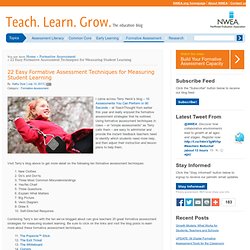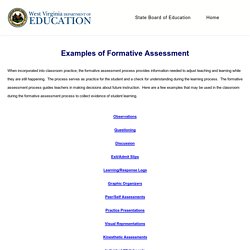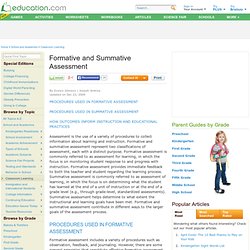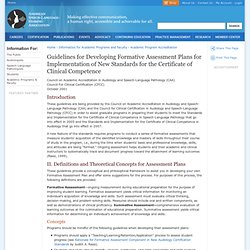

DOKFourContentAreas. Dok_question_stems. CASL_02E_C01. 26949_3. 1_Formative_Assessment_Guide. Ssnces.ncdpi.wikispaces. 22 Easy Formative Assessment Techniques for Measuring Student Learning. I came across Terry Heick’s blog – 10 Assessments You Can Perform In 90 Seconds – at TeachThought from earlier this year and really enjoyed the formative assessment strategies that he outlined.

Using formative assessment techniques in class – or “simple assessments” as Terry calls them – are easy to administer and provide the instant feedback teachers need to identify which students need more help, and then adjust their instruction and lesson plans to help them. Visit Terry’s blog above to get more detail on the following ten formative assessment techniques: 1. New Clothes 2. Do’s and Don’ts 3. Combining Terry’s ten with the ten we’ve blogged about can give teachers 20 great formative assessment strategies for measuring student learning. 11. Here are a couple more assessments you can use to elicit evidence of student learning. 21. 22. All of these 22 formative assessment techniques are simple to administer and free or inexpensive to use. Do you have a favorite? Examples of Formative Assessment. When incorporated into classroom practice, the formative assessment process provides information needed to adjust teaching and learning while they are still happening.

The process serves as practice for the student and a check for understanding during the learning process. The formative assessment process guides teachers in making decisions about future instruction. Here are a few examples that may be used in the classroom during the formative assessment process to collect evidence of student learning. Observations Questioning Discussion Exit/Admit Slips Learning/Response Logs Graphic Organizers Peer/Self Assessments Practice Presentations Visual Representations. Creating a Formative Assessment System. Formative and Summative Assessment. Assessment is the use of a variety of procedures to collect information about learning and instruction.

Formative and summative assessment represent two classifications of assessment, each with a distinct purpose. Formative assessment is commonly referred to as assessment for learning, in which the focus is on monitoring student response to and progress with instruction. Formative assessment provides immediate feedback to both the teacher and student regarding the learning process. Summative assessment is commonly referred to as assessment of learning, in which the focus is on determining what the student has learned at the end of a unit of instruction or at the end of a grade level (e.g., through grade-level, standardized assessments). Summative assessment helps determine to what extent the instructional and learning goals have been met. Formative assessment includes a variety of procedures such as observation, feedback, and journaling. Feedback. End of unit tests or projects.
Guidelines for Developing Formative Assessment Plans for Implementation of New Standards for the Certificate of Clinical Competence. Council on Academic Accreditation in Audiology and Speech-Language Pathology (CAA) Council For Clinical Certification (CFCC) October 2001 Introduction These guidelines are being provided by the Council on Academic Accreditation in Audiology and Speech-Language Pathology (CAA) and the Council for Clinical Certification in Audiology and Speech-Language Pathology (CFCC) in order to assist graduate programs in preparing their students to meet the Standards and Implementation for the Certificate of Clinical Competence in Speech-Language Pathology that go into effect in 2005 and the Standards and Implementation for the Certificate of Clinical Competence in Audiology that go into effect in 2007.

II. Definitions and Theoretical Concepts for Assessment Plans These guidelines provide a conceptual and philosophical framework to assist you in developing your own Formative Assessment Plan and offer some suggestions for the process. Concepts Models II. 1. 2.